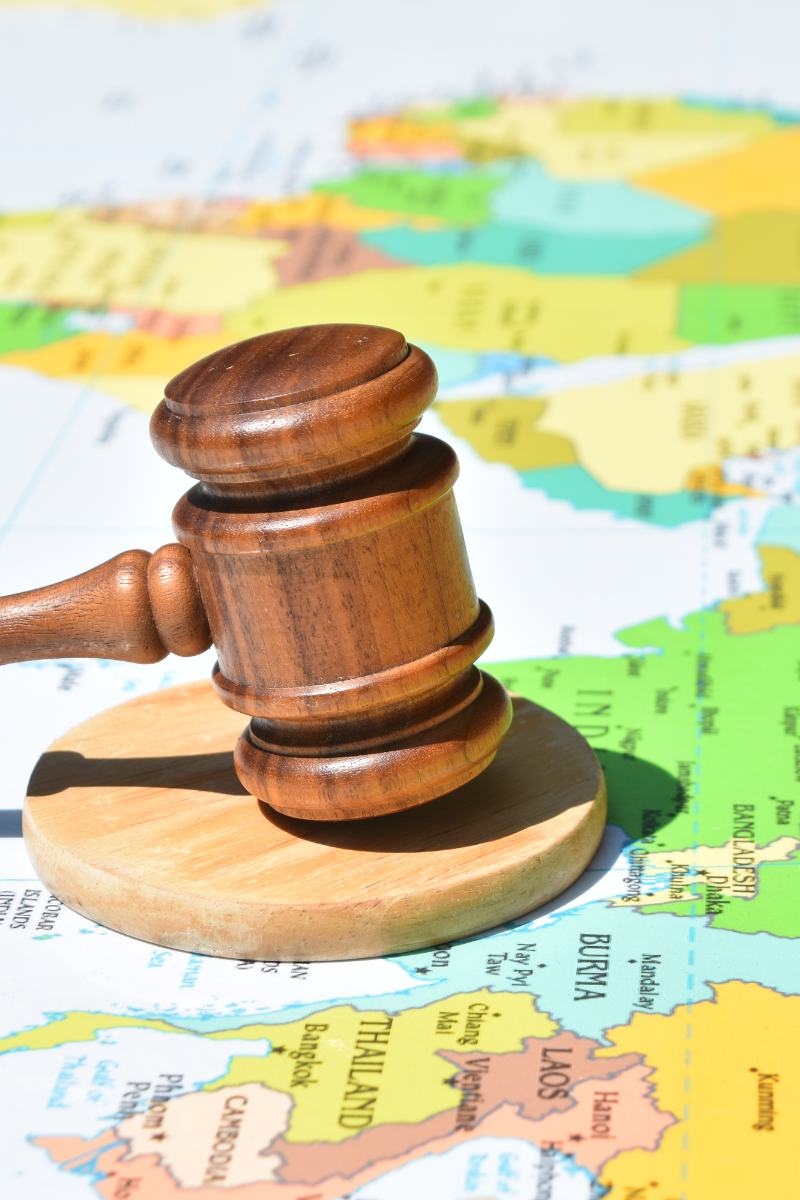National Child Abuse Prevention Month: How the Hague Convention Protects Children
Every April, National Child Abuse Prevention Month serves as a reminder of the importance of protecting children from harm. While much of the focus is on domestic child abuse prevention, international child abduction is an issue that can also lead to trauma for children.
When a child is wrongfully removed from their country of habitual residence, the Hague Convention provides legal pathways to help ensure their safe return. At Masters Law Group, we handle complex Hague Convention cases and help parents navigate the legal system to protect their children’s best interests. In this blog, we explore how the Hague Convention plays a critical role in child protection and what parents need to know if they face international child abduction.
 The Importance of National Child Abuse Prevention Month
The Importance of National Child Abuse Prevention Month
National Child Abuse Prevention Month (NCAPM) is dedicated to raising awareness about child abuse and neglect while advocating for stronger protections for children. One of the key issues addressed during NCAPM is Adverse Childhood Experiences (ACEs)—potentially traumatic events that occur before a child turns 18. These can include:
- All forms of abuse and neglect.
- Parental substance use or mental illness.
- Parental incarceration.
- Parental child abduction.
- Domestic violence.
- Divorce.
Child abduction is a devastating form of abuse that can leave lasting psychological and emotional scars. Being forcibly taken from their home and loved ones shatters a child’s sense of security, stability, and well-being. Organizations like the National Center for Missing & Exploited Children (NCMEC) and the Child Welfare Information Gateway are crucial in providing resources, guidance, and support to help parents and guardians protect their children and navigate the complexities of child safety.
Understanding the Hague Convention 
The Hague Convention is an international treaty designed to help protect children from the harmful effects of abduction and wrongful retention across international borders. While the Hague Convention is primarily known for facilitating the return of children who a parent has unlawfully taken, it also serves as a critical tool in protecting children from potential abuse, neglect, or exploitation.
Key Provisions of the Hague Convention:
- Immediate Return of Abducted Children: The treaty establishes a legal process for returning children to their country of habitual residence, discouraging international parental abduction.
- Best Interests of the Child: Courts prioritize the child’s well-being when deciding on Hague Convention cases.
- Limited Defenses for Retention: A parent can only refuse a child’s return under specific circumstances, such as evidence of grave risk of harm or if the child has settled in their new environment.
1. Preventing Harm Through Legal Protection
The wrongful removal or retention of a child across international borders can lead to devastating emotional and psychological consequences. The Hague Convention prevents this by helping ensure that children remain in environments where their safety, education, and emotional stability are protected. The legal framework helps ensure that a parent cannot unilaterally remove a child to escape abuse allegations, deny the child access to the other parent, or put them in potentially harmful situations.
2. Addressing Abuse in Hague Convention Cases
A significant concern in Hague Convention cases is when a parent argues that returning the child would place them at grave risk of harm—one of the key defenses against return. The courts evaluate this claim carefully. If the alleging parent can provide substantial proof of abuse, domestic violence, or neglect, the court may deny the child’s return or establish protective measures.
The Grave Risk Exception under Article 13(b) of the Hague Convention states that a court can refuse a child’s return if it is demonstrated that doing so would expose the child to physical or psychological harm or place them in an intolerable situation. Factors that courts consider when reviewing grave risk of harm claims:
- Documented history of domestic violence or child abuse.
- Verified reports from child protection services.
- Testimony from medical professionals or therapists.
- Risk of neglect or unsafe living conditions in the child’s habitual residence.
 3. The Role of Domestic Courts in Child Abuse Prevention
3. The Role of Domestic Courts in Child Abuse Prevention
While the Hague Convention establishes international cooperation in handling abduction cases, domestic courts play a crucial role in protecting children from abuse. U.S. courts work closely with family law attorneys, child protective agencies, and international authorities in Hague proceedings to evaluate each case thoroughly. In some instances, courts may order safeguards, such as:
- Supervised visitations upon the child’s return.
- Orders of protection against the alleged abusive parent.
- Mental health assessments for the child.
- Temporary custody arrangements in favor of the non-abusive parent.
How Parents Can Use the Hague Convention to Protect Their Children
If you believe your child is at risk of international abduction or has already been wrongfully removed, it is critical to act quickly. Here are the steps to take:
Step 1: Contact a Hague Attorney Immediately
Legal intervention is time-sensitive when dealing with international abduction cases. Masters Law Group Partners Erin E. Masters and Anthony G. Joseph possess a deep knowledge of The Hague Convention and the International Child Abduction Remedies Act (ICARA). They are uniquely positioned to help guide you through the legal process and fight for your child’s return to their rightful home.
Step 2: File a Hague Petition
A Hague Convention petition must be filed in the appropriate court to initiate the return process. This petition should detail:
- The child’s habitual residence.
- The circumstances of abduction or wrongful retention.
- Any evidence supporting the claim (e.g., legal custody agreements).
Step 3: Gather Evidence of Abuse (If Applicable)
If you believe your child faces grave risk if returned, you must provide substantial evidence demonstrating abuse or neglect.
Step 4: Work with International Authorities
Since Hague Convention cases involve multiple jurisdictions, working with the trusted Hague Convention Attorneys at Masters Law Group and international agencies is essential for a successful resolution.
Work With Masters Hague Convention Attorneys
Navigating the legal and emotional complexities of international parental child abduction requires skilled and compassionate representation. At Masters Law Group, our experienced child abduction lawyers are dedicated to helping provide results-driven support to families facing these challenging situations. Our team is here to guide you every step of the way, helping protect your family’s rights during this difficult time.
Explore our proven track record in this area of law by reviewing our case successes here:
2024:
- District of South Carolina Rock Hill Division / Mexico: Decision and Order/ Motion for Summary Judgment
- Northern District of Illinois / Ireland: Memorandum Opinion and Order
- Western District of Michigan / Brazil: Representative Decisions
- District of Colorado / Colombia: Aguirre, Decision and Order
2023:
- Northern District of California / Cyprus: Efthymiou v. Labonte, Findings of Fact and Conclusions of Law
- Southern District of Iowa / Mexico, Order Adopting Report and Recommendation
Prior:
- Eastern District of Wisconsin / Mexico: Hinnendael, Decision and Order
- Northern District of Illinois / New Zealand: Ho, Memorandum Opinion and Order
- Northern District of Illinois / Lithuania: Sulcaite, Memorandum Opinion and Order
Final Thoughts
National Child Abuse Prevention Month serves as a powerful reminder of our collective responsibility to protect children from all forms of harm, including international parental abduction. The Hague Convention plays a crucial role in safeguarding children, ensuring their safe return, and preventing wrongful removals that can have lasting emotional and psychological effects.
At Masters Law Group, we are committed to advocating for parents and children impacted by international abduction cases. If you need legal guidance or assistance with a Hague Convention case, our experienced attorneys are here to help.
Contact us today to protect your rights and your child’s future.
Frequently Asked Questions (FAQs)
What qualifies as an international parental abduction?
International parental child abduction occurs when a parent wrongfully removes or retains a child outside their country of habitual residence without the other parent’s consent or legal authorization.
What if my child does not want to return?
Under the Hague Convention, a child’s objection may be considered if they are of sufficient age and maturity to express a reasoned preference (typically 12 years or older). However, the court ultimately decides based on the child’s best interests.
Can a parent refuse to return a child under the Hague Convention?
Yes, but only under limited defenses such as:
- Grave risk of harm (Article 13b).
- The child is settled in the new country (if more than one year has passed).
- The left-behind parent was not actively exercising custody rights.
Does the Hague Convention apply to all countries?
The Hague Convention only applies to member countries that have ratified the treaty. If your child has been taken to a non-signatory country, alternative legal measures may be required.
How long does a Hague Convention case take?
The Hague Convention mandates expedited proceedings, ideally within six weeks. However, complexities such as appeals, evidence gathering, or jurisdictional issues may extend the timeline.



















